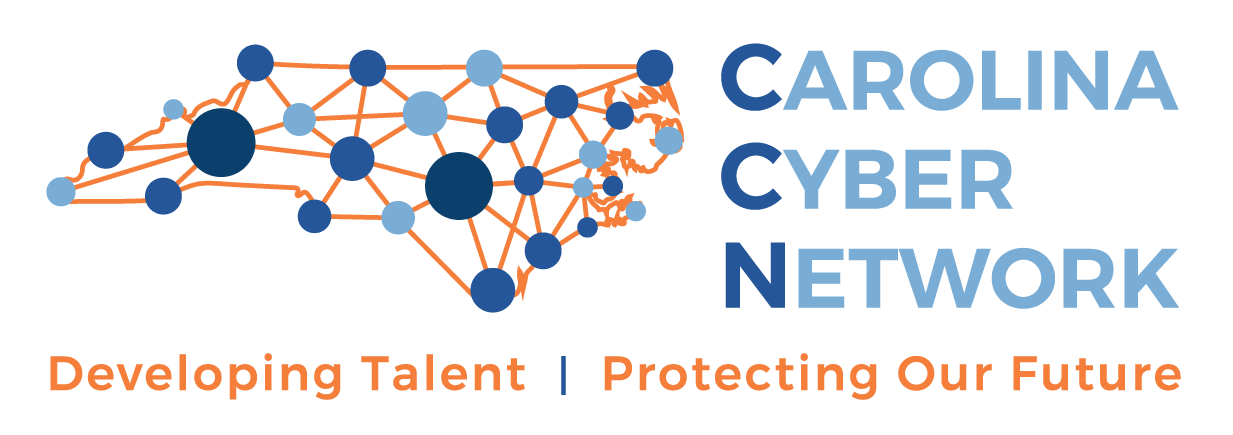
Sector & Work Group Projects
Sector Projects
Agriculture
Scott Queen, Blue Ridge Community College
The Agriculture Sector Group (ASG) is focused on increasing awareness among farmers, distributors, and consumers of potential cybersecurity threats to the agricultural sector, increasing cybersecurity training specific to agriculture at CCN member schools, and establishing partnerships with business and industry to identify and address their needs. Scott Queen, the director of the ASG, participated in a panel discussion at the Western NC AgTech and Agribusiness Discovery Event at the WNC Ag Center where he highlighted his work with the Carolina Cyber Network and Agriculture Sector group and emphasized the potential cyber threats to the nation’s food supply.
Government and Military
Scot McCosh, Fayetteville Technical Community College
This sector group is engaging in innovative opportunities for students to gain practical skills to prepare them for cyber security careers in public and private organizations supporting governmental entities and the military. Teams of students are being formed, in a pilot project, to conduct soft cyber assessments for local governments in partnership with the NC Regional Councils of Government (NCCOG). These teams will gain technical skills and build essential life skills as they liaise with leaders, give presentations, and summarize outcomes readying them for the workforce.
Finance
Greg Sayadian, Montreat College
The Finance Sector Group has collected job descriptions for entry and journeyman cyber-related positions in the financial sector and is working to map corporate requirements to task statements and knowledge, skills, and abilities with the goal of mapping classroom work to actual job roles and corresponding tasks. In addition, the group is identifying the primary methods used by financial institutions to recruit cyber talent.
Healthcare
Athena Smith, Catawba Valley Community College
The Healthcare Sector Group is developing a continuing education and workforce development cybersecurity-focused curriculum and healthcare cybersecurity certifications. The course content and an instructor’s guide will be shared with CCN member institutions to be used in the advancement of their cybersecurity programs. The group also plans to create cybersecurity tabletop exercises for industry partners.
Manufacturing
Rodney Cobb, Cleveland Community College
The Manufacturing Sector Group is focused on developing research, education and outreach programs to assist manufacturers with compliance to applicable cybersecurity regulations and transform legacy manufacturing to digital/cyber manufacturing. The group plans to develop compliance training modules and readiness assessment tools for small and medium manufacturers.
Work Group Projects
Curriculum Alignment
Victoria Ferrell, Forsyth Technical Community College
The curriculum alignment working group is focused on aligning CCN member schools’ cyber security curricula with the Center of Academic Excellence knowledge units (KUs) and industry needs. The group has conducted a comprehensive analysis of existing required cybersecurity courses for North Carolina community colleges leveraging the CAE-Cyber Defense (CD) Designation Requirements as the guiding framework to develop recommendations for a set of core cyber courses aligned with those requirements.
Educational Technology
William “Nikitah” Cummings, Fayetteville Technical Community College
A valuable benefit to the CCN member institutions is the provision of licenses for students to access cyber ranges where they can apply skills learned to defend against simulated cyber attacks. The cyber ranges provide students with the simulated “real-world” experiences that have proven to be invaluable in developing the skills of our students, preparing them for cyber competitions, and to be work-ready upon graduation. The CCN currently has contracts with both Range Force and Cyberbit.
K-12
Thomas “Tony” Brown, Forsyth Technical Community College
The K-12 Working Group is exploring ways to work with the NC Department of Public Instruction to incorporate cybersecurity education into K-12 curricula. The group is researching strategies in other states to gain an understanding of best practices in K-12 cyber education and to inform the development of strategies for building a successful and effective K-12 cybersecurity education pathway.
Professional and Essential Life Skills
John Sheuring, Carolina Cyber Center of Montreat College
Professional and Essential Life Skills is a modular curriculum designed to teach, coach, and mentor students in their development of skills and abilities “essential” to a successful career in cybersecurity. Specifically, while technical skills and the associated validation (badges, certifications, degree, etc.) can enable a person to “get the interview,” and professional skills (e.g., punctuality, clarity of written and verbal communications, dealing with conflict) might get a person a job. This group is reviewing the content curriculum, how it is currently being used, and how it can be used in a variety of program and delivery formats.
Groups focused on utilities, transportation, and biotech are planned for 2024.

